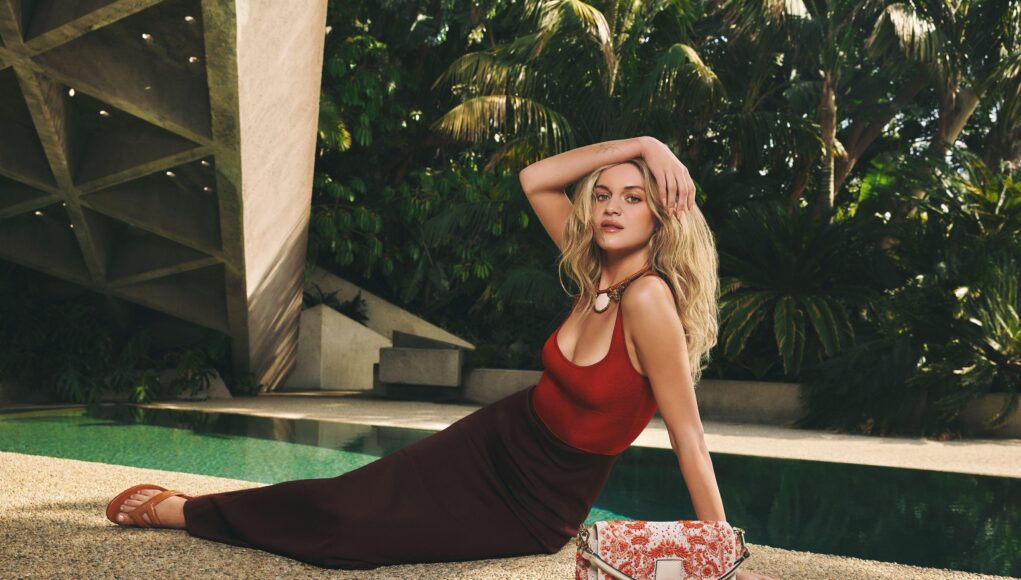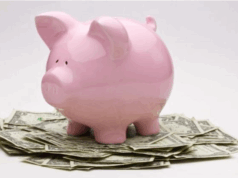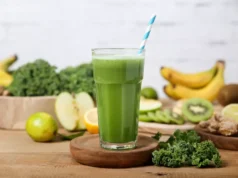There’s a saying in the music industry: “You have your whole life to make your first record and then two days in between tour dates to make your second.” As she quotes this to me, Kelsea Ballerini is on tour herself. Backstage, she’s wrapped up in a gray tour hoodie, a rack of clothes and a white guitar behind her. It’s Valentine’s Day, and after polishing off a pink-sprinkled doughnut, she takes a break to talk to me on the anniversary of the day that changed her career.
Exactly two years before, she had released Rolling Up the Welcome Mat, a spiky six-song EP that chronicled her divorce from fellow country singer Morgan Evans in unsparing detail. For Ballerini, who grew up religious in Tennessee, the idea of divorce felt taboo, and dropping an album about it even more so. “I remember being like, ‘Oh man, I’m terrified.’ I went to sleep, and the next morning, I was like, ‘Oh, it’s okay. People are finding this and connecting with this.’ But it was definitely a scary feeling.” It also marked a watershed moment for Ballerini: Between the explicitly autobiographical terrain she was mining, and the exploding market for country music in general, it introduced her to a whole new audience.
Now she has fans come to her concerts with signs reading, “Just got a divorce.” She cautions that “I try to never celebrate it until I know if it’s a good thing. I don’t ever want to be a poster child for divorce. It’s been three years now. It’s simply not in the forefront of my life anymore. But I always make sure when these women come up to me, my first reaction is never, ‘Oh my God, congratulations!’ It’s like, ‘Are you okay?’ Because just like it needs to be destigmatized, I also don’t think it should be celebrated or glamorized.”
These days, Ballerini is in a completely different headspace. Her personal life, she says, is “unrecognizable from how it was a couple of years ago, and thank God.” She’s been in a relationship with Outer Banks actor Chase Stokes for over two years (at one point, he makes a cameo in our interview, popping up in her dressing room, and she greets him with a “Hi, honey”). Her most recent album, Patterns, is a more settled affair, one that she did indeed write parts of while on tour. Tracks like “Sorry Mom,” a mature apology to her mother (she laughs as she tells me the story of making Stokes play the demo for her mom), and “We Broke Up,” a resigned non-kiss-off, are new territory for her, informed by the journey she’s been on in therapy.
This summer, she will finally have some much-needed downtime. Future album plans haven’t yet coalesced but, she says, “I intend to do more genre blending. That excites me.” She would “die” to work with SZA. She’s dipped her toe into acting, guest-starring on Dr. Odyssey last year, and she’s a coach on this season of The Voice. Over the holidays a few years back, Ballerini says, she had dinner with her manager and asked, “‘What’s my blind spot? Where can I be better?’ And he said, ‘You need to stop acting like you’re new here.’ So I’ve been trying to stand in my success more and not make myself smaller. I think that’s a lesson for all women—to be really proud about our wins.”
You started writing songs when you were in middle school as a way to process your parents’ divorce. How has songwriting been an outlet for you throughout your life?
I was at that age where so many things were changing. I was getting tall; boys were getting cute. There was a big family divide that happened, not just between my mom and dad. Being an only child, I needed somewhere to go. I have a lot of feelings all the time, and I needed somewhere to put them.
For Patterns, you worked with an all-female songwriting team: Hillary Lindsey, Karen Fairchild, Jessie Jo Dillon, and Alysa Vanderheym. Why did you make that choice, and what was that experience like?
I wish I could tell you that my intention was to make an all-girls club record, but that would be dishonest. The truth is, I was so frozen after Welcome Mat, because the intention behind that was not to be a commercial success in any capacity. It was literally just this six-song collection that I made quietly with one other person, Alysa, to the point where it didn’t even count toward my record contract.
And then it connected like it did. So when it was time to make my “proper album,” I didn’t know where to start, because I felt this pressure to follow it up and do it well. I had to really dissect what made that work and then ask, “How do I translate that to my life now?” I knew that if I was going to start writing, I needed to do it with people I felt safe with. And so I called my friends, who are some of the most in-demand songwriters in music, but they’re also just my friends. I was like, “Hey, can we go away somewhere really cozy and cute for two days? I will supply so much wine, and can we just see if there’s anything? And if there isn’t, it’ll still be two days of womanhood.” If that’s the worst-case scenario, we’re doing all right. We ended up writing “Sorry Mom,” “Two Things,” and “Baggage.” And I was just like, “There it is.” I felt this immense relief and release, but also a sense of freedom that I had never really felt before. I keep saying it wasn’t just a co-write, it was walking life for a year with each other.
Your music has sometimes been categorized as “sad girl country.” But this album touches on a lot of different things. There’s pain, but there’s also happiness and love. Sometimes there’s this idea that we can only write about tough times and that being content isn’t interesting. If your life is fodder for a lot of what you’re writing and your life has changed a lot, what does that look like in terms of putting it to paper?
I’ve always gravitated toward writing about the unsteadiness in life, whether that’s a version of heartbreak or just growing pains. I love writing about growing up and the uncomfortable nature of that. The hardest part for me is to write when I’m happy, like you said. It’s so much easier, because songwriting is so therapeutic for me, to sit down when I’m down in the dumps about something rather than when I’m happy. Because when you’re happy, you want to go exist in your happiness, not sit down with your guitar. But I will say making Patterns was truly reflective of the year and a half that I wrote it. So there is turmoil and growing pains in that, and there is happiness, but it’s not sugarcoated.
Even “First Rodeo,” which I think is the first love song that I wrote for Patterns, is literally saying, “I fell off the horse. That was embarrassing. I felt like damaged goods. Oh my God, here you are. Can we take this slow because this is not where I saw my life going, but now I want to try this again?” It’s an unconventional love song, and that’s what interests me—the nuance of it, not just “Friday night in your truck, let’s go to the bar.”
What has it been like doing this tour and seeing people connect with the album in person?
It’s always been my goal to be a woman who headlines arenas. Especially in country music, you don’t see it a lot. I think that I, and my whole team collectively, had this “If not now, when?” mentality.
Seeing the crowd is one thing, but feeling the crowd is another thing. We’re locked in. The show is structured as an emotional roller coaster. I get to feel it every night with people, and that’s the dream.
Cowboy Carter won Album of the Year at the Grammys, and Lana del Rey and Zayn Malik have made country pivots. What is your take on all of these artists making inroads into country?
If we, as country artists, feel like we can have a collab on top 40 or have a collab with an R&B artist, why wouldn’t we give a welcome to someone else? I think that’s where people who are pushing back really need to check themselves, because music is for everybody. And specifically country music, the marquee of it is it’s the people’s story.
You have supported LGBTQ rights and brought drag queens onstage at the CMTs when your home state of Tennessee restricted drag performances. What has it been like being in country music, feeling like you want to speak to a wide audience, but wanting to stand up for your beliefs?
I had to shift my mindset from wanting to speak to a wide audience to wanting to speak to my audience. I had to get out of my head, because I’m such a chronic people pleaser: Any element of turmoil or people being mad at me feels crippling to me. And so I never really was loud about anything for a really long time, because I just had to get my footing. And then I was like, “At the end of the day, I want the people who listen to my music to know what I stand for and hopefully align with it.”
Two days ago, we had a queen in the audience in Philly, and I felt so deeply grateful that they felt safe enough to be there in the theater in the wig. And that’s what I care about now. I want my sliver of the world of music—the 15,000 people who are out there—to know we’re aligned and we can be a safe place and keep going out into the world and trying to do the right thing. When I think about it on a wider scale, it’s too much. I don’t know where to start. But I know that I can start with me and how I show up within my community.
Hair by Lacy Redway for Tresemmé; makeup by Alexandra French at Forward Artists; manicures by Natalie Minerva at Forward Artists and Ginger Lopez at Opus Beauty; produced by Petty Cash Production.
A version of this story appears in the May 2025 issue of ELLE.
GET THE LATEST ISSUE OF ELLE








